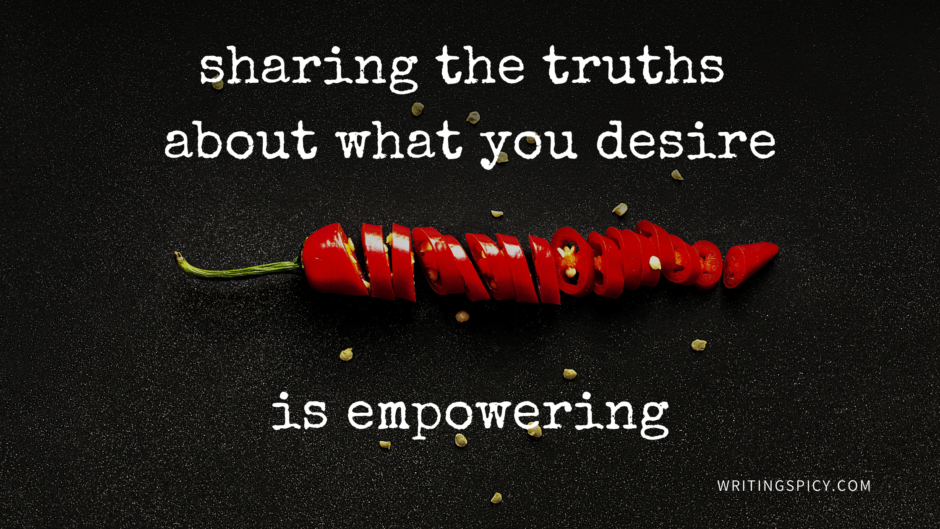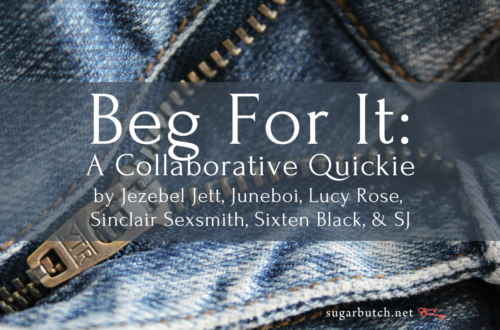This site contains explicit writings on kink practices, dominant/submissive relationships, and queer kink erotica (among other things). All characters in role play or non-consent scenes are consenting adults. Content warnings are included.
As I’ve been inviting folks to attend the online erotica writing group, I’m hearing a lot of this:
“Ack, I can’t go to an erotica class, what if someone found out?”
“I’m not ready! I’m so behind on my reading, and I haven’t written erotica in years!”
“What if someone tells me my writing is not good?”
“What if someone tells me that the kink thing I write about is bad & wrong for reasons I’d never thought about?”
Let me tell you a little bit more about the philosophies behind the Writing Spicy groups.

1. Absolutely NO Kink or Sex Shaming
In Writing Spicy, you can write about any kink or sex that you want to write about. (We do have a list of guidelines for topics that we give content warnings for; more on that in a bit.)
This thought, though, has comforted me immensely throughout my erotica writing attempts: No matter how kinky, dirty, nasty, or “immoral” you might think your fantasies (or your character’s fantasies) are, there is always someone who wants something “more perverted” than you do. (This is very easy to prove with just a few clicks of the internet.)
People who have joined these writing groups so far have been so generous and supportive when it comes to sex, kink, and expressions of desire and erotics that are unconventional.
2. Separate the Writer from the Narrator
Because many erotica stories are written in first person, it’s easy to talk about a piece of erotic writing by somebody as something the author themself wants to experience or that they desire. But in Writing Spicy, we separate our writer selves from the writing just a little bit, and discuss the narrator as a character (even if the narrator is the author).
For example:
Instead of saying, “I liked how you were talking dirty throughout all of the sex.”
I say, “I liked how the narrator was talking dirty throughout all of the sex.”
This helps to depersonalize the feedback and separate the content from the writer themself. It also helps to get a little distance, so that if there is confusion, or strong emotional reactions, they don’t get pushed onto the writer, but rather stay with the narrator.
3. Feedback Focuses on What’s Working Well
Based in Pat Schneider’s Amherst Writing Workshop method, and Tara Hardy’s method at the Bent Queer Writing Institute, we focus on the following things in our feedback as a default:
- What is working in the piece
- What stays with you
- Any questions you might have
I find that when we focus on what we’re doing well, we often crowd out parts that aren’t working quite as well. It also helps us build up our identities as writers and have more confidence in our abilities.
If writers in the course want feedback beyond those three main points, they are welcome to ask for the kind of feedback they want. But generally, we’ll stick to these as a guideline for our feedback.
4. We Cultivate Care
There’s a particular list of content that is required to have a warning at the beginning of it, and that includes: non-consent, force, rape, or other assaults; consensual non-consent; Master/slave language; Daddy/Mommy, other familial language, incest; self harm; drugs & alcohol; eating disorders; blood; knives; breath play; pedophelia; beastiality; throwing up; and face slapping. (This is also subject to change for each individual cohort, if anyone in the group needs to be warned before certain kinds of content.)
Ever read stories on AO3? They use tags extensively. Content warnings can kind of work like tags, where the major actions and occurrences in the story are tagged and shown in the heading of the story. I see more and more writers who are heavily influenced by the work on AO3 — and why not? There is some amazing work on there — and I think content warnings and tags are becoming much more normalized than they have been in the past.
By including content warnings, we are letting everyone in the class choose whether to read something that could throw off their mental state for a long time. Sometimes, we just have to choose to not take in information about a particular thing, because we know it will do some damage. I’m encouraging us all to be discerning and go easy on ourselves.
The past few years have been really hard, y’all. There’s so much suffering out there. So I just want to do my part to make things more easeful, where I can.
(Don’t worry — plenty of the writers like the dirty, dark, edgy stuff, including myself and Ash, who will be assisting with feedback.)
5. Come See Me In Office Hours
In addition to the workshop each week, I’ll also be hosting office hours on Zoom, and anybody who wants to can join me. I’ll answer questions, look at writing, talk craft theory, or do some writing sprints — whatever the folks who show up want. So if you need a little extra support, pep-talk, or if something specific comes up for you during the class, you can reach me to talk about it even further.
Got any more questions? Go ahead and email me, sinclair@sugarbutch.net, to ask.
I hope you’ll join me and everybody else for another round of this supportive writing group.




